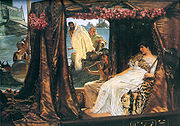
Tryphé
Encyclopedia

"voluptuousness",
"magnificence"
and "extravagance", none fully adequate—is a concept that drew attention (and severe criticism) in Roman antiquity when it became a significant factor in the reign of the Ptolemaic dynasty
Ptolemaic dynasty
The Ptolemaic dynasty, was a Macedonian Greek royal family which ruled the Ptolemaic Empire in Egypt during the Hellenistic period. Their rule lasted for 275 years, from 305 BC to 30 BC...
.
Classical authors such as Aeschines
Aeschines
Aeschines was a Greek statesman and one of the ten Attic orators.-Life:Although it is known he was born in Athens, the records regarding his parentage and early life are conflicting; but it seems probable that his parents, though poor, were respectable. Aeschines' father was Atrometus, an...
and Plutarch
Plutarch
Plutarch then named, on his becoming a Roman citizen, Lucius Mestrius Plutarchus , c. 46 – 120 AD, was a Greek historian, biographer, essayist, and Middle Platonist known primarily for his Parallel Lives and Moralia...
condemned the tryphé of Romans such as Crassus and Lucullus
Lucullus
Lucius Licinius Lucullus , was an optimate politician of the late Roman Republic, closely connected with Sulla Felix...
, which included lavish dinner parties and ostentatious buildings.
But there was more to Ptolemaic tryphé than dissipative excess, which after all can be pursued in residential or geographical seclusion, and for purely private purposes. It was a component of a calculated political strategy, in that it deployed not just conspicuous consumption
Conspicuous consumption
Conspicuous consumption is spending on goods and services acquired mainly for the purpose of displaying income or wealth. In the mind of a conspicuous consumer, such display serves as a means of attaining or maintaining social status....
but also conspicuous magnificence, beneficence and feminine delicacy, as a self-reinforcing cluster of signal propaganda concepts in the Ptolemaic dynasty.

